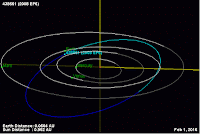Asteroid
2016 CG18 passed by the Earth at a distance of 151 400 km (0.39 times
the average distance between the Earth and the Moon, or 0.10% of
the average distance between the Earth and the Sun; 131 400 km above the
orbit at which the satellites supporting GPS systems operate),
slightly at about 6.30 pm GMT on Saturday 6 February 2016. There was no
danger
of the asteroid
hitting us, though had it done so it would have presented only a minor
threat. 2016 CG18 has an estimated equivalent diameter of 3-12 m (i.e.
it is estimated that a spherical object with the same volume would be 3-12 m in diameter), and an object of this size would be expected to
explode in an airburst (an explosion caused by superheating from
friction with the Earth's atmosphere, which is greater than that caused
by simply falling, due to the orbital momentum of the asteroid) in the
atmosphere more than 60 km above the ground, with only fragmentary
material reaching the Earth's surface.
2016 CG18 was discovered on 3 February 2016 (three days before its closest approach to the Earth) by the University of Arizona's Catalina Sky Survey,
which is located in the Catalina Mountains north of Tucson. The
designation 2016 CG18 implies that it was the 207th asteroid (asteroid G18)
discovered in the first half of February 2016 (period 2016 C).
2016 CG18 has a 397 day orbital period and an eccentric orbit tilted at an
angle of 5.04° to the plane of the Solar System, which takes it from
0.93 AU from the Sun (i.e. 93% of the average distance at which the
Earth orbits the Sun) to 1.18 AU from the Sun (i.e. 118% of the average
distance at which the Earth orbits the Sun). It is therefore classed as an Apollo Group Asteroid (an
asteroid that is on average further from the Sun than the Earth, but
which does get closer). This means that close encounters between the
asteroid and Earth are extremely common, with the last having occurred
in July 2014 and the next predicted in February 2017.
See also...
 Meteorite unlikely to have killed man in Tamil Nadu. Indian newspaper The Hindu carried a report
on Sunday 7 February 2016 in which the death of a man and injury of
three other people as well as causing damage to several nearby buildings
at the campus of a college in Vellore, Tamil Nadu, were described as...
Meteorite unlikely to have killed man in Tamil Nadu. Indian newspaper The Hindu carried a report
on Sunday 7 February 2016 in which the death of a man and injury of
three other people as well as causing damage to several nearby buildings
at the campus of a college in Vellore, Tamil Nadu, were described as... Asteroid 2016 AK193 passes the Earth. Asteroid
2016 AK193 passed by the Earth at a distance of 9 157 000 km
(23.8 times the average distance between the Earth and the Moon, or
6.12% of the average distance between the Earth and the Sun), slightly
before 2.00 a m GMT on Saturday 30...
Asteroid 2016 AK193 passes the Earth. Asteroid
2016 AK193 passed by the Earth at a distance of 9 157 000 km
(23.8 times the average distance between the Earth and the Moon, or
6.12% of the average distance between the Earth and the Sun), slightly
before 2.00 a m GMT on Saturday 30... Asteroid (438661) 2008 EP6 passes the Earth. Asteroid
(438661) 2008 EP6 passed by the Earth at a distance of 7 505 000 km
(19.5 times the average distance between the Earth and the Moon, or
5.02% of the average distance between the Earth and the...
Asteroid (438661) 2008 EP6 passes the Earth. Asteroid
(438661) 2008 EP6 passed by the Earth at a distance of 7 505 000 km
(19.5 times the average distance between the Earth and the Moon, or
5.02% of the average distance between the Earth and the...
Follow Sciency Thoughts on Facebook.

